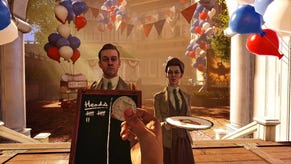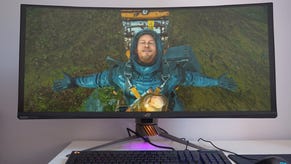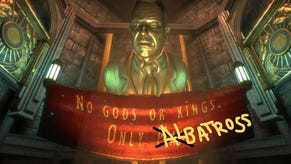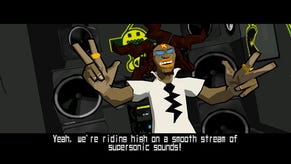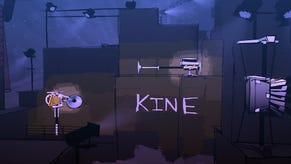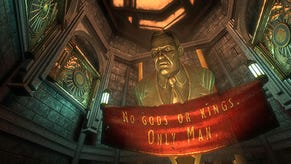Bioshock Infinite: Gillen vs Levine
Meta-booze And Reality Panic
Since abandoning sitting in my underpants writing games journalism for the glittering world of sitting in my glittery underpants writing comics, it takes a lot to get me out of bed. That said, it always took a lot to get me out of bed. I'm lazy. However, a chance to chat to Irrational's creative director Ken Levine about all things Bioshock Infinite counts as something that'll have me tearing the duvet asunder. So when I was asked to do it, I – er – did it.
Gillen: The feeling I got from my friends coming back from E3 was that they were genuinely impressed with Bioshock Infinite. As impressed as they hoped they were going to be, which is a good place to be. How general was that? What did you take from it?
Levine: We felt good. Our goal was to put forward the things that we were most nervous about, not in terms of what were excited about, but in terms of the things that were simply going to be the hardest to pull off, like Elizabeth. Have you seen the demo?
Gillen: Yes. I don't follow many games in development, but I have been following Infinite.
Levine: Okay well the skyline stuff, Elizabeth, the bird, the notion of enemies acting around you without necessarily acting on your, and all the complications that yields. The audience at RPS is a hardcore gaming audience, so they can imagine what this means: it's a lot easier when people are just shooting you. It's much harder when the roles are unclear to the audience. What we want to do is create a world that is continually in tension, but not necessarily place you in combat all the time. Having a woman with you who has to behave believably is an extremely challenging task.
We use these demos to promote that and say, well, this can't be something we have in our office that we can say “that's good enough”... because it has to be something that people respond to. We have raise the standard of where these systems are for us. Demos like the E3 one are helpful for development because we can no longer say “oh it's fine, so what if she walked into some walls?”. She can't. We have to get all that stuff fixed up.

Gillen: I interviewed Doug Church about System Shock and the logic behind it almost a decade after the game came out, and the thought underlying a lot of the design decisions was: “We're just not very good at doing people”. So they stopped trying to do people for that game. What makes you feel confident about going back and doing people now?
Levine: Doug's completely right, and that was the brilliance of System Shock 1. His brilliance was to keep people out of the world, but keep them in the audiologs. Our team certainly benefited from that through System Shock 2 and Bioshock 1. But you know, now it's almost twenty years after System Shock 1, and oh my God....
[There follows a brief nervous breakdown where interviewee and interviewer realise it's 20 years since System Shock 1.]
Levine: 20 years. We have to move on. We bit the bullet. It was along the way into the game that we decided that. Initially we said, well, everyone you meet is going to be crazy like in Bioshock. But then we began to think on that and.... what if you have someone with you? Someone who isn't crazy? What if you don't know how crazy anyone is? What if they're not behind a glass wall? We just kept working on that. It's a really hard problem, and so that's why the game is taking as long as it is. To do it in a shooting environment, that's hard.
It's a Bioshock game, so people expect a certain level of polish and visual oomph that you don't expect from an RPG necessarily in moment-to-moment. Our action sequences are much more custom, much bigger. We have this opportunity to create this great level of consistency, like the scene in the doorway where she puts your hand around her neck, that's so specifically animated. But then when she is in the world her actions have to be roughly on a par with that, consistent with that, even though we have no control over what the player is doing, or where he is going to be. It's really complicated and really challenging, but we thought “it's time to make it happen”.
Gillen: So what's the real challenge? Apart from “everything”, what have you had to push and pull at to get that stuff working?
Levine: Okay, so, because we have these very specific moments – we know you're going to go through that door and Elizabeth and that's a scripted moment – then when you're just walking around the city, we don't know what the player is going to be doing. So the rest of the stuff in the store's demo is not intended to be scripted in the same way - like the part where she puts on a Lincoln mask. She's just goofing around. She's using her own systems to do that. We build in these little moments, like the Lincoln head moment, and we build them where they can happen in a variety of play-throughs, and we have to have some redundancy, and we didn't want them to repeat, or to stack up. So we had to build this system where the game is watching: Has Elizabeth done anything interesting for a while?Is there anything interesting that she could do here? Ah, there's this Lincoln head, let's do this. It's walking an interesting line between scripting and emergence. Because you can't just have pure emergence, you have a semi-emergent system where things like the Lincoln head can happen, if the situation is right.

Gillen: That's interesting. I am comparing that in my head to Portal 2, which was great, but highly ritualistic. It set things up with dialogue when you walk into the room, then punchline when you get out of the room, and silence in between, and it's interesting to see how scripted that is. Trying to walk a line where the scripting is much more situational is a more lively solution to the same problem. That strikes me as a potentially better solution to creating character.
Levine: Right, and also we do no have these custom, contained rooms. Wheatley and those other characters in Portal 2 are so well done, but by contrast we can't always know when things are going to happen in the same way. We quite often don't know where and when things are going to happen. So what we are doing now is working to figure out this very complex problem. But if you are not challenging yourself then you are probably not going to end up rewarding your audience. So that is what we are trying to do here.
Gillen: Keeping with the Valve theme, one of the most interesting explanations of their craft was them talking about Alyx, and specifically the things she says and how that makes the player feel. What considerations did you bring to Elizabeth? What were the concerns you had for crafting her personality and behaviour?
Levine: Our goal with Elizabeth was to get players to feel like there was a connection. There's obviously a connection between Booker, the character, and Elizabeth, but we want the player to feel a connection between themselves and Elizabeth. How many hours were you with your wife before your relationship really started off? Probably a lot of hours.
Gillen: Well we were drinking! So that helped.
Levine: Right, and drink is an accelerant for a relationship. And we can't get the player drunk, so what do we do to accelerate the relationship? I started thinking about how a very sick patient often rapidly feels an intense bond with their doctor, because they're in danger. The same is true of people in combat. This tuned us to the nature of sacrifice, and to what a character wants and will sacrifice to get it. Elizabeth wants to control her own destiny and she'd rather die than not control her own destiny. We thought that this was something people could empathize with, but we also thought that sacrifice rapidly builds connections between people. People sacrificing for one another creates strong bonds quickly, and the demo is a microcosm of the whole game in that sense. It's about what the characters sacrifice for each other.
Then of course she has to be nice and funny and charming, she can't be a bore. So there's levels of macro and micro decision making to make this stuff work. She's there to help you throughout the game. She makes your life better. She can toss you ammo, point out enemies, to bring in the tears, and she's a very you-centered AI. You are not obligated to take care of her in the way that you are in an escort mission.
Gillen: Okay, that mention of the tears is a useful segue. Can you talk about the inspiration behind that? It sort of reminded me of the Amber books with all the cross-dimensional stuff there?
Levine: I haven't read the Amber books, but what I can say is that the notions of alternate realities has always fascinated me. I'm sure with us both being comic book fans you can appreciate that!
Gillen: Hell, yes.

Levine: I always love “What If?” The comic when I was growing was great, I loved it, but I was disappointed by the endings. It always ended with the characters dying! That was what always happened in What If. I was always interested in those notions, of course, and we had these notions in the last demo, these ideas of tears from a narrative standpoint, but they weren't really leveraged in a moment-to-moment gameplay example. So we really thought about that. We don't want Elizabeth just coming into play in these big narrative moments, we want her impacting on what's going on all the time. We kicked around a tonne of ideas for this and eventually we started thinking about, well, you have all these tools in Bioshock games, and we wanted another way you could impact on the world that wouldn't be too complicated – your hands are already full! - what if we took this narrative notion of things that don't exist in your world and connect them to gameplay elements? How would that work? Well it's essentially like a summoning spell, where Elizabeth has a number of summons, or desummoning! It can change geometry, it can change the number of enemies, what weapons you have, if there are turrets, you having some degree of control over that, we thought, was really interesting.
Gillen: One of my old rants is that the theme of “what is reality” is one of videogames' natural themes, as in there's something about games nature which makes exploring the nature of reality, and their reality, really powerful. The fact that so many people have played with that theme a little... well, how much was that in your mind?
Levine: If I really talk about the theme I am working on it would be a spoiler, so I am going to avoid that. The notion of that, the vehicle we are using to express the theme, I can't give that away right now. But anyway, you know Andrew Meyer, right?
Gillen: Yup.
Levine: I was talking to him about Inception, so spoiler alert, and what we were talking about was the top spinning at the end, and what Drew said was really interesting: “Well, it's not a dream, it's a movie.” Which is a comment on how we need things to be “real” in fictional spaces. That's fascinating to me because none of its real, but there are layers of reality that we apply to fictional experiences.
Gillen: It's been interesting dealing with the Marvel stuff because one of the questions the audience will ask is “is this a real story, or not?” Did this really happen to Spider-man?
Levine: And that's so important to the audience. People require a degree of consistency for their suspension of disbelief. It's fascinating to me how fudgeable the word “real” is.
Gillen: Okay. Returning to more prosaic themes: How did you decide what was Bioshock? What mechanics did you bring across? The respawn tube? What matters?
Levine: Well we are still working on our approach. Some things will exist as they do in Bioshock but in modified forms, but others will not appear. We're not talking about respawning yet because we're still finalising how that will work. We want to make sure we get that right. Other things that will be the same will be having weapons in one hand and something like plasmids in the other hand. Also similar are what were called gene-tonics in the first game and are called nostrums in this game, one of the things we looked at was how much we liked having all those character decisions, but it was interesting how you never really stuck with those decisions.
The gene-tonics – nostrums – in this game can be found in unstable form, and we kind of were inspired to that from Heroes Of Might & Magic. In that you choose from one of four powers when you level up, and we're not going to slot out the passive powers in this game, they're just going to go on the pile. Once you make a decision about what talent to take from the unstable nostrum, that skill is attached to you for the game. And there's a tonne of them, I don't even know how many, maybe over a hundred. So you are making these micro-decisions all the time, and you have to make these a lot of them during the course of the game. If you can find a specific nostrum in a vending machine or whatever, then you have to pay more for that, because you're selecting it specifically. When you choose these things they become part of your character sheet – you do actually have a character sheet – and you can see how these skills make that up.
Gillen: A thought I had about the city being in the sky: when co-developing for console and PC, one of the issues that gets raised is that when taking a game to a gamepad you tend to lose the vertical. As in, it's more problematic to look up and down with thumbsticks than it is with a mouse. But Infinite seems to have a lot of verticality to it...

Levine: Obviously the goal is to make a game that is not frustrating for the player. There are two ways to do that. One is the space you make, and we've chosen to make quite a vertical space. Then there's How Does The World Work. People think games are these giant skinner boxes in which you have no real say about what spawns where, but of course as developers we do have control over that. The goal is to put the game in front of people and you tweak your controls, and tweak your controls, and tweak some more until it feels right for that space, and then ask: What combat experiences do we want to have and how should those feel? Within that you are configuring how you move, how the character accelerates and so on, and also you are configuring how your enemies spawn and how they behave. And in that you are trying to create an interesting experience for the player. I wish I could say that there is some kind of magic formula for that, but it's just a lot of tweaking.
Gillen: A magic formula would be useful in game development. “Don't worry, just follow this graph.”
Levine: Right, it really would, and there's no magic formula because what it comes down to is smart decisions
Gillen: Okay, this is a question Jim asked me to ask you: “How important is it for games to challenge genre tropes?”
Levine: Ha. Well. I try not to be the guy who says “all games should do this” or “all games should be made like this”. And honestly I think there are a lot of developers out there who think that the way they make games is the way games should be made. And I think that would make for a very dull world. I like lots of different types of games. There's an advantage to challenging genre tropes, because you can end up creating something that feels fresh, and there's also a challenge there because you're working without a net to some degree. We like doing it because for whatever reason people pay us to do that.
It's more fun to work without the net, but I think publishers are often quite nervous of that because, well, there's no safety net. We're very lucky, Irrational has been very lucky, because people will pay us to at least try to challenge some of these tropes. Whether we succeed is up to the audience, but we do like to try. Of course I totally see that there's some comfort in saying “oh those guys did that and it was successful, let's do that,” because you can see the path. The hardest things in games are where no-one has really done that before. The Big Daddies, for example, no one had done anything quite like that, or if they did we missed it, which is a shame because we could have copied it! The skylines are similar in Infinite because no one has done anything quite the way we are doing it. Elizabeth – there are examples of companion characters, Alyx for example – but we're doing other things with space that is challenging.
Gillen: What's interesting though is that as soon as you start going outside familiar tropes you are “Original By Default”, which was something I talked about with Doug Church back in that System Shock interview – a lot of the systems in that were controversial, but the point was that they had no idea what they could make, because no one had done a game like that. It was original by default because they were working in an unexplored area. They weren't working inside a construct of a pre-existing genre.
Levine: So you know the scene in Apollo 13 where their oxygen scrubber breaks down and the engineer has to recreate the system? That's why I love engineers. They have what's in front of them and they have to make what they have to make out of that. You have limited time and limited resources, and you have to make it work, so you figure it out. We had some real problems with technology right before the demo, and it was really broken, like Elizabeth was walking into walls and her dress was flipping up around her head. The engineers rallied around to fix it, because we had to, because the date we had wasn't going to change.
Gillen: If you hadn't been able to fix it you should have just given her a bottle of booze and explained that she was drunk.
Levine: You joke, Kieron, but that's often the way you end up solving these problems. “No time to rewrite it, I guess she'll just have to be drunk.” Sometimes that's how you do it. Gotta keep those astronauts alive!
Gillen: Have you moved on your reading and your research from the period that Infinite is set in? Are you still reading around that?
Levine: Oh I am just interested in the period. Although recently I made a rare foray into fiction, because I really don't read a lot of fiction. I read the young adult games, Hunger Games. Read the first one, it's really sharp. For fun I usually read social histories. I'm that kind of nerd.
Gillen: I suppose what I was getting at was what books should people read if they want to follow your thinking?
Levine: Have you read Stephen King's book On Writing?
Gillen: Yes, it's one of the two books I always recommend to people interested in writing. Great book. [The other is Robert McKee's STORY. I recommend them together, because both are true and they're almost entirely contradictory. This tells you something important about Writing.]
Levine: I re-read that.I read Hunger Games. I've read Team Of Rivals, which is about how Lincoln took all his political rivals and put them into his cabinet, so I am usually reading three or four things, and that's what I am on.
Gillen: Okay, last question. John was wondering whether it was going to be problematic to call the game Bioshock Infinite? Surely that's like naming all the sequels at once?
Levine: He's exactly right, and that's why after this I am going put myself aboard a Viking ship, light it on fire, and send myself into the great beyond.
Gillen: Thanks for your time.
The full E3 demo for Bioshock Infinite should be revealed across the internets later this evening.




